"In the end I suppose I'll marry my cousin the Officer…" sighs the coy brunette lounging in bed - as she has regularly been for months –on the line to a supposed media phone-in. Most Egyptians will not have needed to spot the trademark moustache to immediately recognise Gamahir, one of the most popular characters created by the satirist Bassim Youssif for his weekly and widely enjoyed TV programme.

Gamahir chooses between her suitors
Comically shaabi (lower class) - the giveaways include the cheap nylon leopard skin blanket she huddles under, and her deliberately lisped mispronunciation of cousin (ibn-khalchi instead of the proper ibn-khalti) - Gamahir had in previous episodes been agonising over having to choose between two suitors, one il-tayar harbi (the fighter pilot) and the other il-tayar Islami (the Islamic pilot), who were vying for her hand following the breakup of her 30 year relationship with her first husband. Having narrowly chosen the tayar Islami, Gamahir soon started complaining that continual interference from his many ikhwaan (brothers) had reduced her new husband to a changed and impotent man. But riding to her rescue had come one of her cousins il-zabet (the Officer), who, her falsetto rising in proportion to her growing adulation, she describes as si-si-si-si-si-si-sayed (i.e many times more dominant and potent that the mere si-sayed who, in Egyptian slang, rules his family with total and undisputed power and authority). Bowled over as she is by his dashing looks and military swagger and strength, and convinced he is attracted to her as much as she is to him, Gamahir finds il-zabet curiously reluctant to commit to the needs of her ”burning heart”. In a dark moment of truth, she pieces together the threads of her past relationships and abruptly voices doubts as to whether any marital relationship will ever bring her desired resolution.
The highly topical and thoroughly political nature of the satire is explicitly flagged up all the way through. Gamahir means "the masses"; il-tayar is both 'the pilot' and a homonym for "the way"; the Islamic pilot (standing for the Islamic way) is Mohamed Morsi; the fighter pilot (standing for the military way) was Ahmed Shafik, the defeated candidate closely associated with the ousted regime of Hosni Mubarak; her first husband whom she has dumped after 30 years of marriage needs no name to be identified as the hapless Mubarak; and it would not have taken the comically over-repeated emphasis of the syllable si-si-si-si-si for all viewers immediately to recognise the dashing hero il-zabet as General Abdel Fatah el-Sisi, the military strongman and Defence Minister in Morsi's MB Government who on 30 June dismissed the elected President in the name of "the masses".
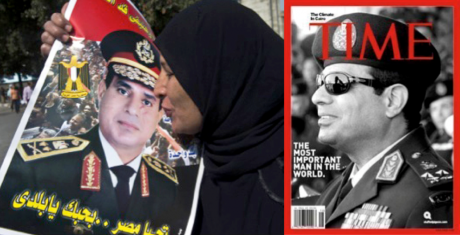
The personality cult of the military Strongman develops
Yet the development of full-blown "Sisi-mania", as it has now widely come to be called, took some months. As I walked around the streets of Cairo in the days immediately following the dismissal of the Muslim Brotherhood Government, the news kiosks (which in the heyday of the 2010 'Arab Spring' uprising against Mubarak had been festooned with 'revolutionary' posters and bric a brac) were only hawking a few smallish, rather official-looking portraits of the new military strongman. Following his televised appeal to "the masses” to take to the streets on 7th July to demonstrate their mandate for the military to rule Egypt, more personality-cult orientated portraits started to be produced and waved about , culminating in much media excitement during September over the prospect of Sisi winning the (non-binding) popular vote for Time Magazine's 'Man of the Year'.
Before long, interesting and parallel developments began to take place in the popular iconography of the new leader, and also in a variety of adulatory consumer products coming onto the market branded with his name. Most immediately noticeable among the latter were TV ads for fast-foods and sweets seeking to demonstrate their superior quality through an appropriation of the great man's name and/or image. There was even a new brand of Sisi cooking oil, guaranteed to make your food more nutritious and invigorating.
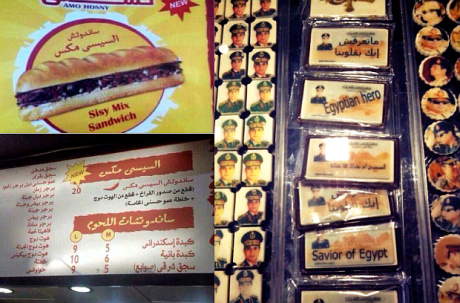
Sisi-mix special strength sandwiches and Hero-Saviour Sisi chocolates
At the same time popular prints started appearing in which the Strongman became transmogrified into a kind of 'Super-male', either explicitly ,through ascriptions such as "Heart of a Lion", or implicitly through depictions of super-human strength and masculinity, portraying the leader like Atlas, bearing the weight of the whole world on his bulging exaggerated musculature.
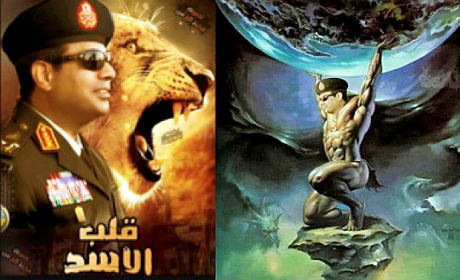
The 'Lionheart' with strength to hold up the whole world
Soon afterwards male consumer products started to appear whose imagery – propagated mainly through digital and social media rather than print media and TV - enticed purchasers to acquire for themselves some of the virility and allure of the new leader.

Il-Sisi rayissi (Sisi is my President) male spray-on cologne
This development of "Sisi-mania" eventually exploded into - and seemed to settle in - the Women's Clothing department, as a welter of female garments branded with the new leader's image and/or name. Some women's goods were relatively unoriginal, such as matching necklaces and bracelets. Others were more controversial, such as Valentine's Day gifts of Sisi-branded matching cushions and mugs (the celebration of of Valentine’s Day having been one the supposedly alien, unIslamic and immoral practices which the MB Government had tried to ban). And many were of an almost startling intimacy, including women's pyjamas, bras, and even knickers, explicitly bearing the super-male's imprint.
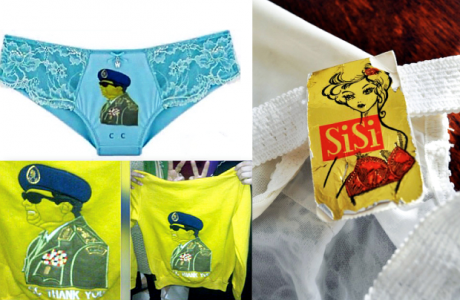
'Super-male' branding on female lingerie
The suggestion that these items of 'intimate' female clothing might carry a charged message, around the Super-male's sexualised domination of helpless and submissive femininity, found iconographic parallels in the emergence of posters and cartoons depicting the new leader as the White Knight riding to the rescue of Egypt- portrayed as a damsel in distress. One cartoon shows 'Sisi-man' lifting Egypt to safety "before she is destroyed". A poster in a similar vein shows Egypt as a bride ('beautiful as the moon') being carried away on a white horse by Sisi the dakar (slang for 'macho') groom, under the approving gaze of Nasser and Sadat staring down from the Pyramids of Giza in place of the Pharoahs of old who built them (with next-in-line Mubarak tellingly air-brushed from the succession).
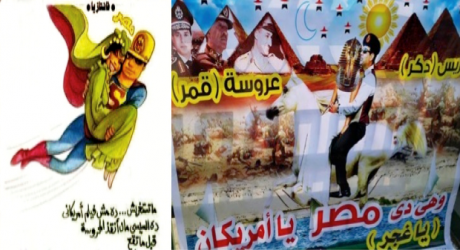
Sisi-man saves Egypt; the dakar (macho) groom takes her as his beautiful bride
The rush of numerous producers to supply and promote a plethora of Sisi-mania consumer kitsch indicates an anticipation of strong consumer demand. Yet the market into which these products were being launched was, as a result of Egypt's economic deterioration (and near-collapse under the MB Government), hardly conducive to the uptake of non-essential or luxury goods. Most consumers were - and, indeed, still are - instead pre-occupied with survival issues of food and security. That Sisi-mania items were nevertheless hitting the mark in terms of consumer choice is thus significant in coming to grips with competing accounts of the ways in which political ideology and consumer practices become important axes for negotiating the meaning of citizenship under the new regime. The notion of 'consumer patriot' begins to take shape and move to centre stage as a viable positioning within the Manichean 'us versus them' discourse of exclusion (the 'terrorists', namely the MB and its supporters) and inclusion ('all right-minded Egyptians') remorselessly promoted on TV talk shows and in the press. The creation of a new category of 'consumer patriot', rooted in a spirit of 'service to the nation', can be seen as a critical turning point in the consolidation of a new pro-military nationalist ideology that is appropriate to the neo-liberal globalised economic order in Egypt. And public voting in inconsequential popularity contests (such as the Time magazine poll referred to earlier) is whipped up to provide an ersatz experience substituting for genuine democratic electoral choice.
Most Sisi-brand products were advertised and brought to market through social media and related digital channels. 'Patriot consumers' therefore found themselves with little option but to demonstrate their fealty by exercising their 'competitive choice' on a lone, individualised basis, in a manner consistent with the forced fragmentation, atomisation even, of the demand side within the globalised neo-liberal economy. And since the leader had not formed any political party, his patriotic consumer-citizen supporters had to look for other arenas in which to express solidarity and seek mutual reassurance and reinforcement on a group or socialised basis (apart, that is, from the sporadic street demonstrations to which the leader summoned them from time to time).
Egypt's tradition of lavish wedding celebrations turns out to be providing fertile opportunities for this, and for creative and explicit displays of Sisi-mania kitsch. Weddings mark moments of special significance in the lives of any Egyptian family, and though nowadays invariably organised in the security and exclusivity of private spaces they remain, at a time when most of the mechanisms that encourage Egyptians to socialise outside the confines of their own home have been closed down, one of the few social occasions for which people seem willing to negotiate the uncertainty, congestion and potential violence of the streets and other public spaces. In addition, marriage has long represented a social project operating on a separate budget financed by dedicated family savings, which often will have been accumulated over a long period of time. Wedding celebrations therefore have the potential to sidestep the deteriorating earnings of most Egyptians whose wages have barely kept pace with inflation, and to legitimise the 'conspicuous consumption' of non-essential luxuries. They thus provide fertile soil for the incorporation of Sisi-mania items into the creative displays of romance as a form of public intimacy which are not only sanctioned, but positively encouraged, within this specific socio-cultural context. For marrying couples and their families, making a creative splash with the Sisi brand can also be carefully calculated to show how the timing of the wedding coincides with a 'historical moment' that is far removed from Egypt's joyless and turgid experiment with Islamist politics
Some photographs circulating indicate that Sisi-mania can also be seen to insinuate itself into marriage celebrations through explicit invocation of the 'super-male' imagery described earlier. Thus the positioning and posture of the groom in the shaabi (lower class) wedding shown can be understood as a somewhat extreme version of the 'Sisi male cologne' brand of patriotic male consumerism. The groom seated (in a deliberately si sayed posture) in front of the Sisi poster, 'wears the brand' in order to imbue himself with the strength and potency of the dakar (macho) Lionheart hero carrying away his bride to consummate their union.
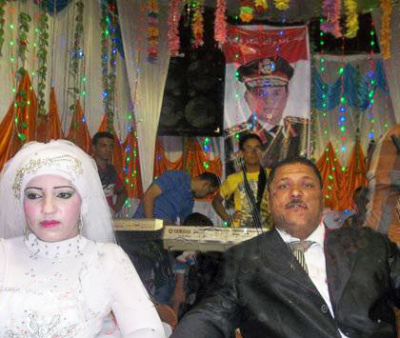
The lion-heart groom prepares to take his bride
And the wedding photos displayed on the Facebook pages of one of Cairo's high society photographers (below), shows how the exclusive private spaces of the rich that resort to Facebook as a ‘society column’ are likewise susceptible to being politicised.
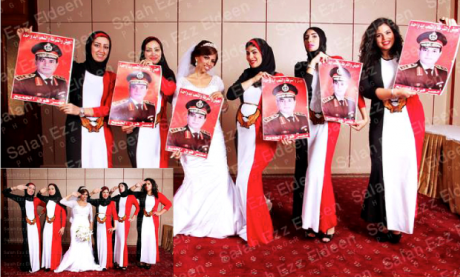
"We are Sisi's girls"
Sisi-mania masks the ways in which active citizenship entails continuing struggles over the definition of social membership, and how specific practices of inclusion and exclusion are inextricably linked to different forms of participation in public life. The politicisation of the private sphere described above operates in thoroughly gendered ways: women are not only marked out as consumers rather than citizens, but also as passive and demure models of conservative behaviour. In this discourse the private space of the home becomes politicised, transformed into a zone of platonic civic virtue and stability. Meanwhile the public spaces outside the confines of the 'home' become increasingly depoliticised and sanitised, and any woman who ventures into them is 'disciplined' and forced to negotiate her sexuality in increasingly brutal ways (ranging from the public stripping of female Tahrir Square protestors by males in the crowd, to the enforced 'virginity testing' of arrested female protestors by the Army and Police).
It may well have been such stories of sexual violence meted out to women who leave the home to be political actors in the ostensibly sanitised public arena which formed the unspoken whispers of Gamahir's demons, hinted at in the uncertainty and despair of her final musings And final is just what those musings proved to be - for immediately after the episode had been broadcast, the TV channel abruptly pulled Gamahir's sketch and character from the show. The channel claimed this to be in response to a public backlash against its 'sexual' and 'indecent' undertones. An alternative reading sees Gamahir as simply the latest female victim assaulted for transgressing some of the boundaries defined and aggressively policed by Egypt's newly re-established order.
Read more
Get our weekly email



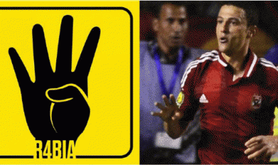
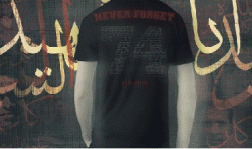
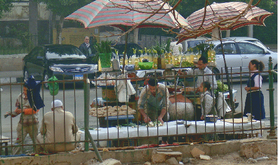
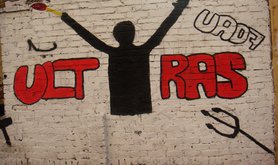
Comments
We encourage anyone to comment, please consult the oD commenting guidelines if you have any questions.